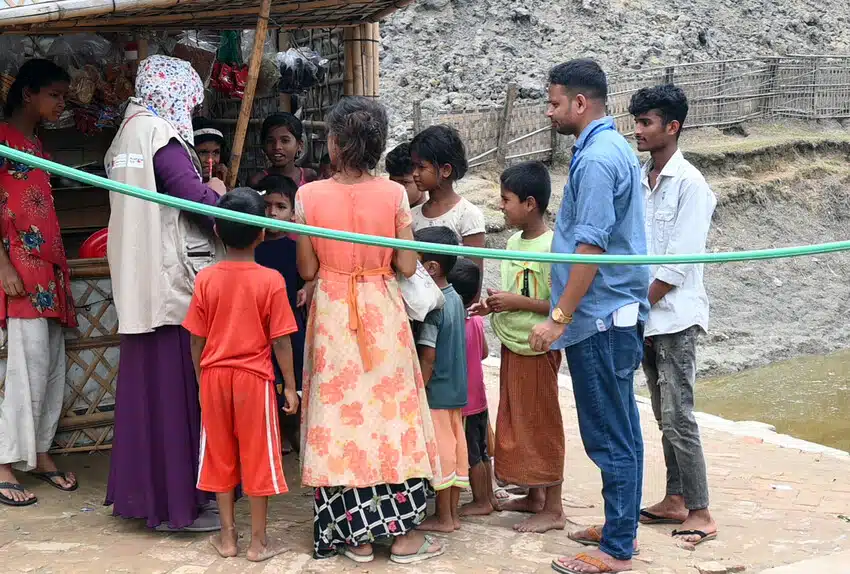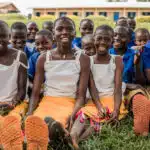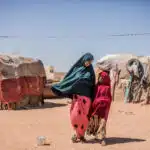Media Centre - Media release - 16 May 2023
Plan International launches emergency response after Cyclone Mocha devastates communities in Bangladesh and Myanmar

Plan International is responding in the aftermath of powerful cyclonic storm Mocha, which yesterday crossed southeast Bangladesh and Myanmar, hitting refugee camps and communities.
The storm hit Bangladesh’s Northern Coast between Cox’s Bazar (Bangladesh) and Kyaukphyu (Myanmar) near Sittwe (Myanmar) yesterday, where there are around six million people already in need of humanitarian assistance, and 1.2 million people displaced.
Kabita Bose, Country Director of Plan International Bangladesh, said: “We are very concerned about people in camps and the wider community in Teknaf and Ukhiya, areas of Cox’s Bazar, and particularly about the protection of children, girls, women, older people with disabilities and their families affected by the cyclone, which has affected tens of thousands of families.
“Girls and young women are particularly vulnerable, as they may potentially face heightened risks of sexual and gender-based violence and exploitation in crowded, unfamiliar settings.”
At midday on 14 May 2023, extremely severe cyclone Mocha hit the coast between Cox’s Bazar in Bangladesh and Kyaukpyu township in Myanmar, with sustained winds of 250 km/h, and wind gusts up to 305 km/h, making it one of the strongest storms on Myanmar’s record12.
Bose added: “Cyclones can be traumatic experiences for children and adults alike, and girls and young women may be particularly vulnerable to psychological distress. They may experience fear, anxiety, and depression in the aftermath of a cyclone, and may need access to mental health support and counselling to cope with the effects of the disaster.”
Plan International is closely monitoring the weather situation and working with partner organisations to mobilise community volunteers at the Rohingya camps in Bangladesh and in the wider community.
This is to ensure face to face awareness for the community, so that those at risk are aware of their nearest cyclone shelters, safe spaces, and emergency contact numbers.
Volunteers from Plan International Bangladesh and its partner organisations also alerted marginalised communities about risks in coastal areas during the storm, so they could take measures to protect themselves from the cyclone. Plan International has already begun reaching out to affected people with support, including hot meals to those in evacuation centres.
Across Rakhine and the Northwest area of Myanmar, there are already about six million people already in need of humanitarian assistance and 1.2 million people displaced. This includes 156,500 Rohingya in Rakhine. The effects of the cyclone will only exacerbate the challenges faced by girls and young women there.
Thousands of people in Rakhine have already been urged to relocate to evacuation centres or higher ground. Displacement camps in coastal areas and along waterways are particularly exposed to storm surges. The government of Myanmar is using religious buildings as shelters.
“We are concerned about the impact the storm will have on children,” adds Haider Yaqub, Country Director of Plan International Myanmar. “This state of emergency can quickly disrupt important elements of children’s lives such as home, play and school.”
“Displacement is unsettling for children. It is essential that we make every effort to provide children, especially girls and young women, access to safe environment, Plan International will play its part to protect them from exploitation and abuse, ensuring they receive adequate nutrition, sanitation and hygiene along with protection services.”
During powerful storms, the lifesaving needs and protection of children, especially girls and internally displaced people, should be a priority, said Yaqub.
“As Cyclone Mocha has made landfall, we have started to witness the carnage it has left behind. It is still too early to assess the damage as the communication infrastructure is badly impacted.
“Plan International has already dispatched emergency teams to Sittwe to support our teams who are already stationed there. Plan International has stocked up immediate relief items such as dry foods, water and first-aid kits, ready to be dispatched to the affected population in northern Rakhine.”
An immediate infusion of funding is required to enable a full-scale response to the cyclone’s adverse impacts and following flooding.
Media contacts


